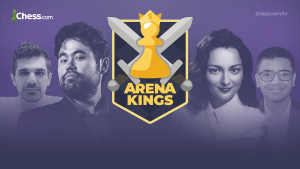
The World Verse
There have been a few challenge matches in the past that test the solitary genius of one exceptional person against the wisdom of the masses. In these "World v. X" matches, "The World" always comes upon its move by voting: every individual who wishes to participate simply picks their favorite move. A computer tallies those picks, and selects the move receiving the most votes. The September 10th Raw Chess Challenge between teen prodigy and world #1 ranked player Magnus Carlsen and-- you guessed it-- "The World" features two dramatic differences.
First, the change that will make a very visible impact: the rate of play. Typically the way such a game has been conducted in the past is through a correspondence style of play with at least 1 day per move (for both the World and the challenger). The current match will be played with 1 minute of thinking time for GM Carlsen and 90 seconds for voting. This means the game will take hardly four hours-- as opposed to four months. This fast-paced format is being made possible by technology designed by www.chess.com, and will have a serious impact on game play: principally I believe it places a lot of extra pressure on GM Carlsen. At that time control, the possibility of a serious oversight, which could cancel out all his other good play, grows. It also has a big impact on how members of the world team will play the game. In past matches, the long voting period gave people time to discuss their moves at length, and try to generate consensus before voting. With such a fast pace to the game, the 'consensus' will be reached by voting rather than by discussion. I think the intensity of operating all-out by one-self, with no safety mechanism to avoid blundering, means that this challenge will be much more difficult for the single player than similar matches in the past.
The next big difference is in the three top-class grandmasters who will be serving as advisors to the world team. In the most famous such match, the Kasparov one, the World team also had several strong players providing advice: Etienne Bacrot, Florin Felecan, Irina Krush, and Elisabeth Paehtz. These were four promising junior players, but the level of advisers for the present game is significantly higher: two up-and-coming players who are already #1 in their respective countries: GM Nakamura of the U.S.A., GM Vachier-Lagrave of France; and GM Judit Polgar, the long-time #2 Hungarian player. All three of these players have been over 2700 level putting them in the absolute top of the world's players, and have competed against GM Carlsen in tournament play. Before each voting period begins, they will spend 60 seconds thinking about the position, and then their suggestions will be registered on the site; their impact on the game is a bit hard to quantify, but obviously ought to raise the level of the world's play.
These differences make it harder to predict the result of the game; but probably there is a serious chance of a win, a draw, or a loss-- which is what makes it a dramatic challenge after all. Participants in the match will have a chance to compare their chess play level not only with their opponent, GM Carlsen, but with the three super-Grandmaster advisors, Polgar, Vachier-Lagrave, and Nakamura, and with the wisdom of the masses, their fellow voters. Add to that a fast-paced nailbiter of a game; and the excellent commentary of GM Maurice Ashley, and this promises to be not only a terrific learning experience but one of the most exciting chess events to watch in recent history.
For the historical record, here are past "World vs." games, though I'm expecting the current challenge may have little in common with them:
The short-lived World Verse tradition started with a whimper rather than a bang. I don't actually know the circumstances under which this game was played (hopefully it was even played; I'm trying to be complete here, but could not come up with any research on this game), but The World did not show much collective wisdom in this wimpy performance. The twelth World Champion, Anatoly Karpov won with ease, despite the disadvantage of the black pieces. The next four games were all played in the correspondence style mentioned earlier, with the world (and its challengers) having at least 24 hours to come up with its moves. Note how tenacious The World is in bad positions, and how it never seems to lose its cool and blunder.
This extremely tense game featured an awesome "race endgame" with both sides having multiple passed pawns in different parts of the board. According to some lengthy analyses, The World could have held the draw in the difficult queen endgame, with extremely accurate play. However, the complexity of that queen endgame was such that both The World and Kasparov (and computer engines at the time) could not solve it. There were some inaccuracies on each side in this phase, and the [generally acknolwedged] strongest chess player in history managed to win a game that was as close as possible. (I believe that 54...Qd5 and 42...Kc1 were improvements that would keep the game within the realm of a draw, but this is a position where deep analysis is of interest, and sometimes leads to being able to extrapolate some principles or ideas of how to conduct queen endgames, while comments like "54...Qd5 draws in 47 moves" are generally useless).
GM Davies seemed to get a large advantage early on in this game, shutting the black bishop out of play for a while with the pawn advance to f5. However, later after winning an exchange, the advanced pawns on the kingside meant his king was exposed, and he could not convert his advantage because of perpetual check possibilities.
GM Becerra held a comfortable small positional advantage throughout this game, but The World's defense was as tenacious and resourceful as in the previous game-- the advantage remained a comfortable small advantage, and never became more. This style of play appeared to give the Grandmaster very little risk of losing, but it also seemed that it would be hard to defeat The World with this approach...
Natalia Pogonina shocked those watching by winning an absolutely crushing positional game. Even after it was over, analysts from the world team (including this commentator) could not say where The World had fallen into a loss.
A large question remaining for the Raw Chess Challenge is what style of play Magnus will choose. Will he play for deep strategies? Will he play for unfathomable complexity and tension? Will he try to play a safe position and test the world's technique? Magnus being such a universal player, there's no guessing what his strategy or even first move will be.






